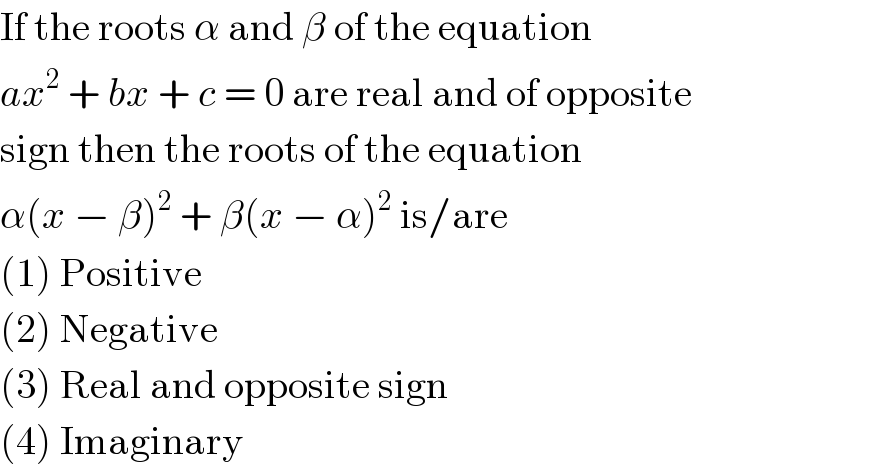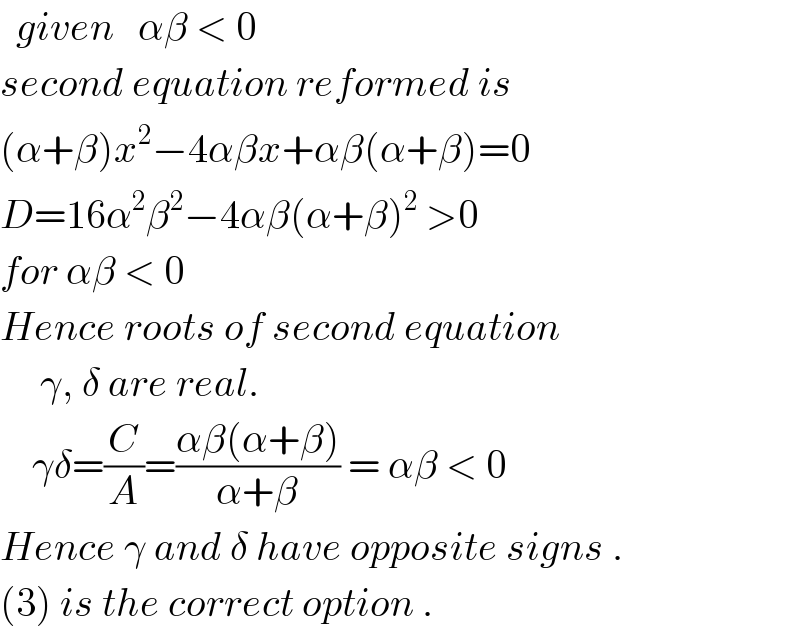Question Number 20052 by Tinkutara last updated on 21/Aug/17

$$\mathrm{If}\:\mathrm{the}\:\mathrm{roots}\:\alpha\:\mathrm{and}\:\beta\:\mathrm{of}\:\mathrm{the}\:\mathrm{equation} \\ $$$${ax}^{\mathrm{2}} \:+\:{bx}\:+\:{c}\:=\:\mathrm{0}\:\mathrm{are}\:\mathrm{real}\:\mathrm{and}\:\mathrm{of}\:\mathrm{opposite} \\ $$$$\mathrm{sign}\:\mathrm{then}\:\mathrm{the}\:\mathrm{roots}\:\mathrm{of}\:\mathrm{the}\:\mathrm{equation} \\ $$$$\alpha\left({x}\:−\:\beta\right)^{\mathrm{2}} \:+\:\beta\left({x}\:−\:\alpha\right)^{\mathrm{2}} \:\mathrm{is}/\mathrm{are} \\ $$$$\left(\mathrm{1}\right)\:\mathrm{Positive} \\ $$$$\left(\mathrm{2}\right)\:\mathrm{Negative} \\ $$$$\left(\mathrm{3}\right)\:\mathrm{Real}\:\mathrm{and}\:\mathrm{opposite}\:\mathrm{sign} \\ $$$$\left(\mathrm{4}\right)\:\mathrm{Imaginary} \\ $$
Answered by ajfour last updated on 21/Aug/17

$$\:\:{given}\:\:\:\alpha\beta\:<\:\mathrm{0} \\ $$$${second}\:{equation}\:{reformed}\:{is} \\ $$$$\left(\alpha+\beta\right){x}^{\mathrm{2}} −\mathrm{4}\alpha\beta{x}+\alpha\beta\left(\alpha+\beta\right)=\mathrm{0} \\ $$$${D}=\mathrm{16}\alpha^{\mathrm{2}} \beta^{\mathrm{2}} −\mathrm{4}\alpha\beta\left(\alpha+\beta\right)^{\mathrm{2}} \:>\mathrm{0} \\ $$$${for}\:\alpha\beta\:<\:\mathrm{0}\: \\ $$$${Hence}\:{roots}\:{of}\:{second}\:{equation} \\ $$$$\:\:\:\:\:\gamma,\:\delta\:{are}\:{real}. \\ $$$$\:\:\:\:\gamma\delta=\frac{{C}}{{A}}=\frac{\alpha\beta\left(\alpha+\beta\right)}{\alpha+\beta}\:=\:\alpha\beta\:<\:\mathrm{0} \\ $$$${Hence}\:\gamma\:{and}\:\delta\:{have}\:{opposite}\:{signs}\:. \\ $$$$\left(\mathrm{3}\right)\:{is}\:{the}\:{correct}\:{option}\:. \\ $$
Commented by Tinkutara last updated on 21/Aug/17

$$\mathrm{Thank}\:\mathrm{you}\:\mathrm{very}\:\mathrm{much}\:\mathrm{Sir}! \\ $$
